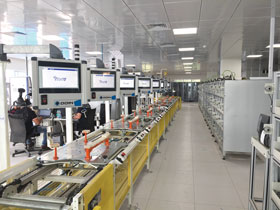

From small-town specialised machine builder to global technology company, Jendamark Automation’s business journey has been characterised by calculated leaps into the unknown. And, as South African manufacturers continue to navigate the murky waters of Industry 4.0, Jendamark has taken the step across the digital divide to implement automation and technology solutions to improve production line efficiencies for the global automotive industry.
First leap – belief in local capacity
“The first leap towards becoming globally competitive was believing in our own technical capabilities as South Africans,” says Jendamark’s sales, design and digital director, Yanesh Naidoo. “Realising that we have the ability to deliver world-class products was critical for us and our industry partners, and today, Jendamark’s manual and automated assembly facilities can be found in at least 18 countries worldwide.”
The company started out in 1992 in Port Elizabeth, where its international headquarters remain today. The post-apartheid economy opened doors to the world, but there were quality issues in the automotive industry as many engineering suppliers were not geared for in-built quality testing. This opened up a gap in the market for standalone machines and testing equipment that drew on the burgeoning field of mechatronics.
While trying to balance out the feast-or-famine cycles associated with new vehicle launches in the local automotive sector, Jendamark also built solutions for the leather tanning, food and beverage, and pharmaceutical sectors.
Around the dawn of the new millennium, Naidoo says, Jendamark started taking on more technologically challenging jobs that showed its faith in South African engineering: “One example would be the Unisys machines we built to serve the Department of Home Affairs. When applying for your ID, you used to fill out a form, place your fingerprints in ink and clip your ID photo to it. Thousands of these forms were fed into Jendamark machines, which would scan the document using special algorithms to check the integrity of the fingerprints and digitise the document. At that stage, people wondered what we were doing.”
Second leap – global recession
When the impact of the global recession hit South Africa’s developing economy, many companies – Jendamark included – took a beating. Most turned inwards for security and focused on capturing as much of the local market as possible.
“It seemed counterintuitive at the time, but we decided to switch our focus to global exports instead and started serving the automotive sector exclusively,” explains Naidoo. “It was a massive leap for us, trying to understand the global market and narrowing the development of our products in such a niche and specialised way.”
To gain entry into the competitive European and Asian markets, Jendamark opened a sales office in Germany and a manufacturing facility in India. The new strategy paid dividends, and year one, the company easily achieved its 50% export target. Today, exports account for 95% of Jendamark’s automation business.
For both the South African and Indian operations, the core business remains the manufacturing of automotive powertrain and catalytic converter assembly facilities. The latter offering has grown with the development of adaptive canning facilities to accommodate all the variations OEMs need to meet the Euro 6 and Bharat Stage VI emissions standards for Europe and India respectively.
Third leap – the networked economy
“With the rise of Industry 4.0, and more specifically the opportunities to digitise the complete manufacturing system, the technology side of our business is booming,” says Naidoo. “But it remains inextricably linked to our core business of building machines. Without the machines, our technology would not exist. And without the technology, our machines would become obsolete.”
Jendamark calls this digital manufacturing solution ‘Odin’ – an ecosystem that integrates people, production lines and data. Odin WorkStation, for example, is an operator guidance system that provides step-by-step animated instructions for assembling complex parts, and uses augmented reality add-ons such as smart glasses.
Jendamark has also developed Odin LineWatch, which provides real-time production line data, while Odin Manager offers production insights and web-based reporting.
In addition, technology centres at both its Indian and South African operations allow Jendamark design teams and customers to do virtual reality walk-throughs of proposed production lines. Once the line is signed off and in production, VR can also be used to train operators, so that they are ready to hit the ground running once it is installed.
“Odin is Jendamark’s answer within this networked economy,” concludes Naidoo. “We’re building this software portal, which is open to partnerships with customers and third-party developers to create their own custom solutions that run on Odin. This way we have a more inclusive approach to solving manufacturing problems.
“Offering your customers value is no longer just about money. In this new networked economy business models will change. You may need to offer value-added solutions free of charge. Your customer may become your partner. Successful companies like Facebook (Whats App) and Google (Maps) understand this.”

© Technews Publishing (Pty) Ltd | All Rights Reserved